MONTY PYTHON’S FLYING CIRCUS – Complete Series 3 (Fully Restored in HD)
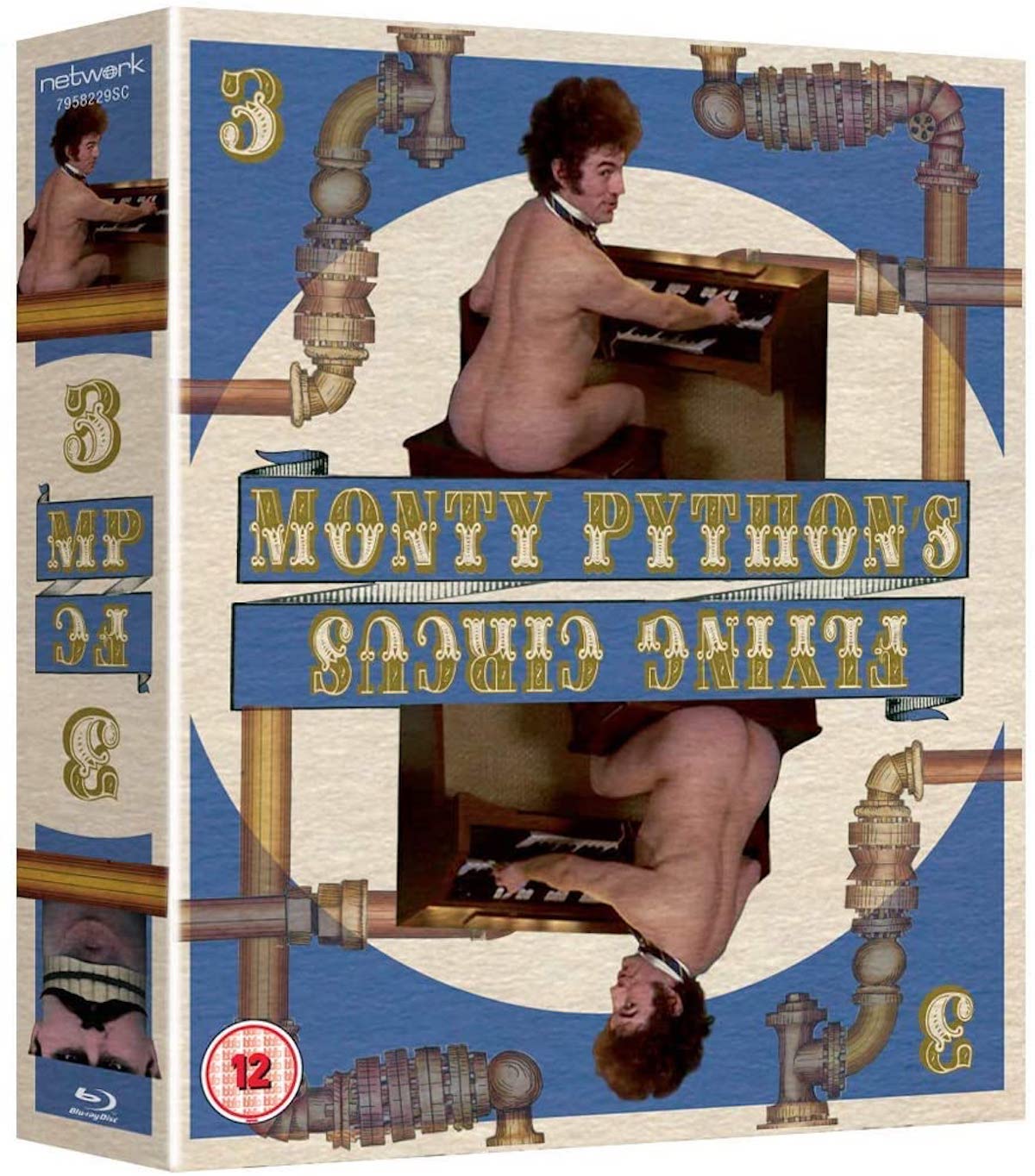


Continuing my reviews of Network Distributing’s remastered high-definition versions of Monty Python’s Flying Circus (read the first and second parts here), Series 3 finds the show at its height of popularity on television, albeit with a few signs of fatigue or repetition and less classic sketches in its arsenal. John Cleese wasn’t convinced to return after this batch of 13 episodes, and it’s easy to see why he thought they’d peaked already, but that’s not to say Series 3 is without its highlights. And it has a more experimental flavour in general.

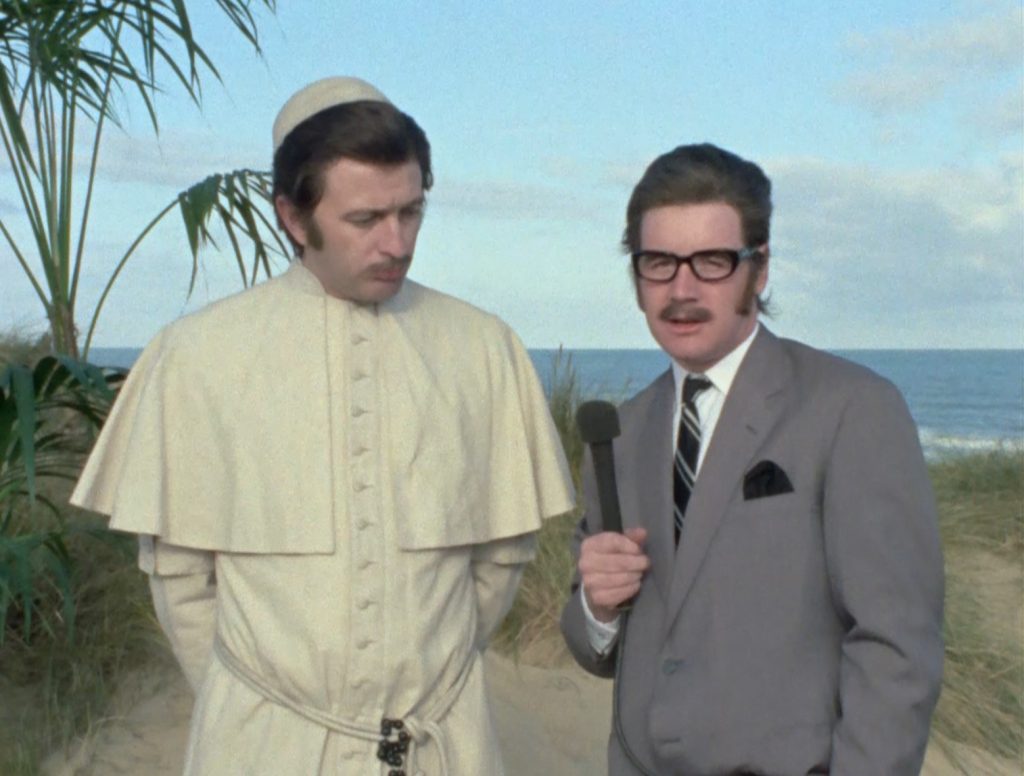
One senses a boost in production quality with the opening instalment of Monty Python’s Flying Circus’ third series, which also boasts new opening credits (where the title is revealed by pipes instead of roses, preceded by Terry Jones’ naked pianist). “Whicker’s World” appears slicker with its transitions and the outside filming was choreographed better. It even seems like a linking sketch with John Cleese as a BBC executive was shot on 16mm film instead of video-tape (as everything shot indoors tends to be)? Terry Gilliam’s animations also seemed better integrated into live-action, and there’s even a creative medium-breaking moment when one of his iconic drawings (“Mrs Cutout”) walks past the camera during the live-action “Mrs Premise and Mrs Conclusion at the Launderette” sketch.
There are two recurring sketches in this episode that hold things together; the first is a Viking pastiche called “Njorl’s Saga” that wasn’t to my taste, but “Multiple Murderer Court Scene” was genuinely amusing (with Eric Idle playing a killer who wins the admiration of everyone in court by being overly polite when sentenced) and the courtroom set kept being returned to. There’s even a strange moment in one of the courtroom sketches when something hilarious happens off-camera (Gilliam can be seen guffawing in the background behind Michael Palin, who soldiers), which got me very curious. It turns out an actor swaddled in bandages (playing the defendant) fell over when being switched with a dummy off-camera, forcing Palin to stifle laughter as the studio audience chortled at something viewers at home couldn’t see. Like many episodes, the “Whicker’s World” title only gets explained at the end, with a sketch where all the Python’s impersonate Alan Whicker (a famous British journalist and documentarian, who died in 2013).
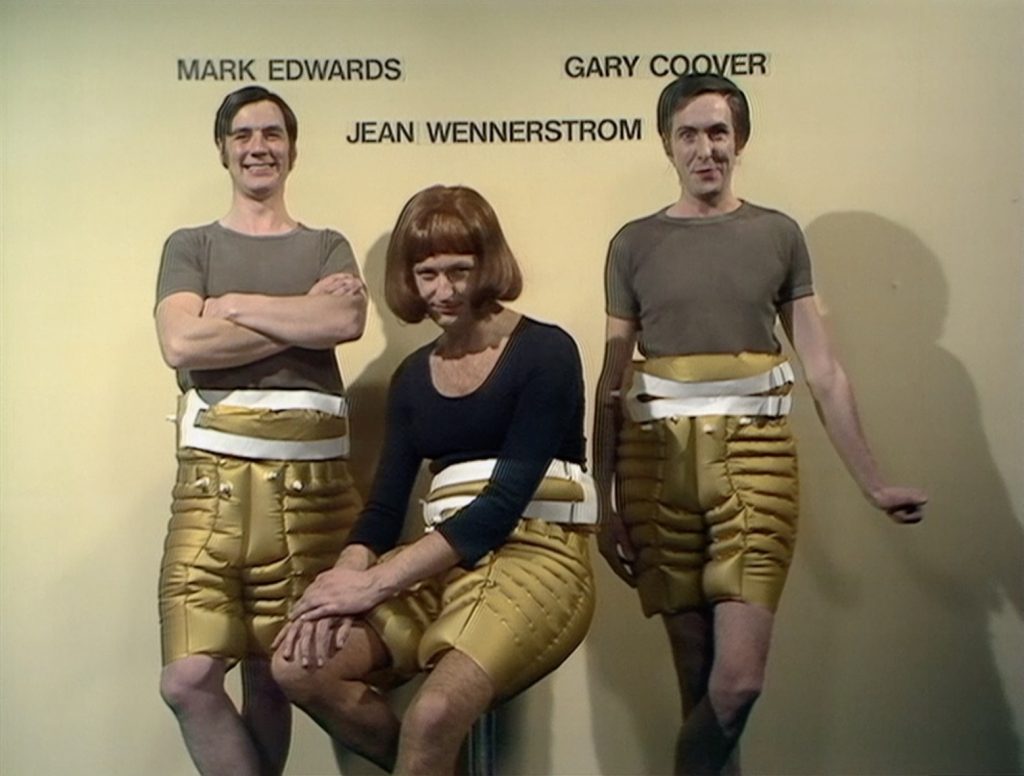
An episode of two halves, qualitatively. I enjoyed the opening sketch which gave this instalment its title, with a couple investigating the genealogy of those in their community of Hounslow from Surbiton, as if the two places are as far apart as Central Africa and northern Europe. Monty Python often took ludicrous ideas to extremes, so this was consistently amusing. Another comedic device is to juxtapose two things, and the following two sketches leaned into that the most: a “Schoolboys’ Life Assurance Company” sketch where three naughty boys are brought to the Headmasters’ office and it becomes clear their tomfoolery has involved things far beyond what would ordinarily be expected of immature kids; and a parody of Blue Peter (which was celebrating its 15th anniversary in 1972) called “How to Do It”, where three wholesome kids’ TV presenters weakly explain how to do things that far surpass what children are expected to know (like curing all illnesses).
After a promising start and a run of amusing ideas, culminating in the iconic “Fish-Slapping Dance”, the back half of this half-hour isn’t as successful. “Trim-Jeans Theatre” (concerning a merger of acting and weight-loss) is a little baffling, and a “Titanic Sinking” sketch only raises a few giggles before it segues into a “SS Mother Goose” riff on pantomime. But there is a bizarre and rare addendum to this instalment after the credits have rolled (presented on stray sheets of paper for a change) when the vagabond “It’s” man (Palin) is revealed to have his own chat show with guests Lulu and Ringo Starr (played by themselves). It shows how popular Flying Circus had become by ’72 to get those two stars involved, and works as an amusing meta-joke about how the Python’s have the clout to get big-name stars involved… but ultimately waste them in favour of fish-slapping nonsense.
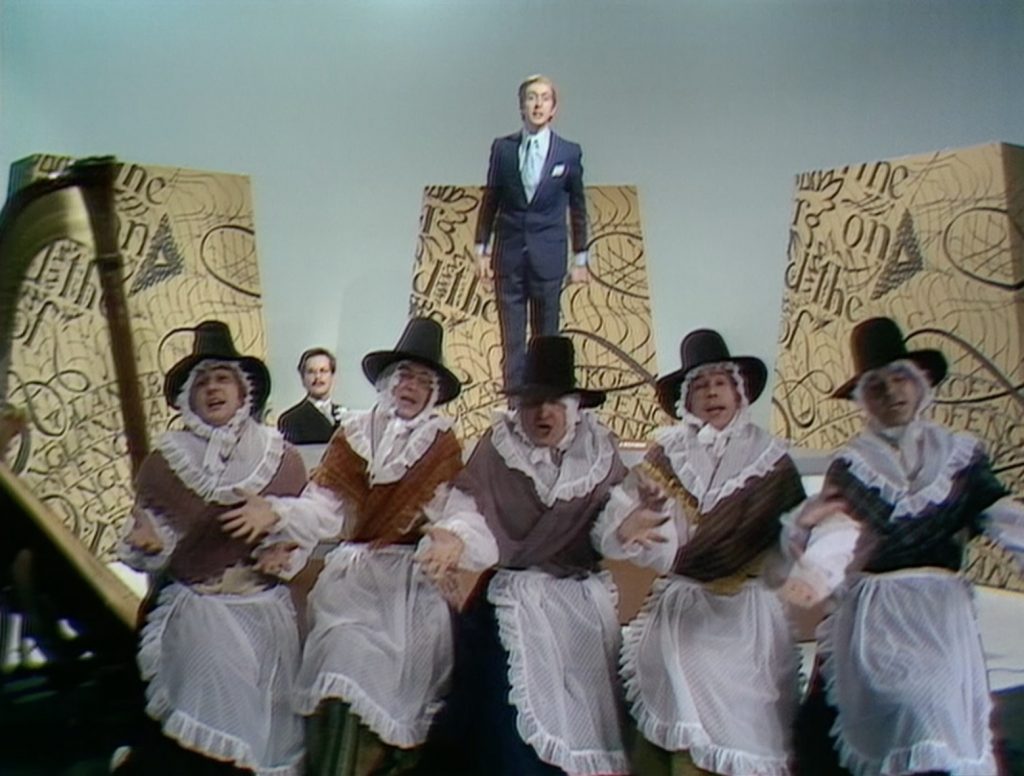
Generally speaking, this isn’t a particularly good episode. There’s a long middle section that feels like it dominates things too much, with a loose string of sketches concerning a jungle expedition — not helped by the fact Michael Palin and Eric Jones are both in blackface. One has to make allowances for the fact 1972 was a different time, but it’s still uncomfortable seeing two comedy heroes (and eventual national treasures) with their face and bodies coated in brown shoe polish. But there are some good sketches, including one that doesn’t get much praise called “Erizabeth L” (a spoof of 1971’s BBC serial Elizabeth R) where everyone in the cast switches their l’s and r’s around in words. Python often found a lot of humour in simple ideas like this, and it’s done with aplomb (“broody herr!”) I also enjoyed the aforementioned jungle sketch’s joke when four lost explorers become aware of a camera crew, then when the angle changes to film them greeting said crew they start to wonder who’s now filming that scene. Perhaps knowing “The Money Programme” was a little weak, the end credit roll six minutes earlier than usual… but the show continues with one of my absolute favourite sketches: “The Argument Skit”. This is a wonderful piece of writing (by Cleese and Chapman) with Palin as a man paying Cleese to argue with him, and it squeezes every drop of comedy from the idea of an argument happening without the arguer being totally sure if the “session” has begun or not. The sketch is a gem and was deservedly reprised for Monty Python at the Hollywood Bowl (1980). A joy that singlehandedly rescued a fairly mediocre half-hour.
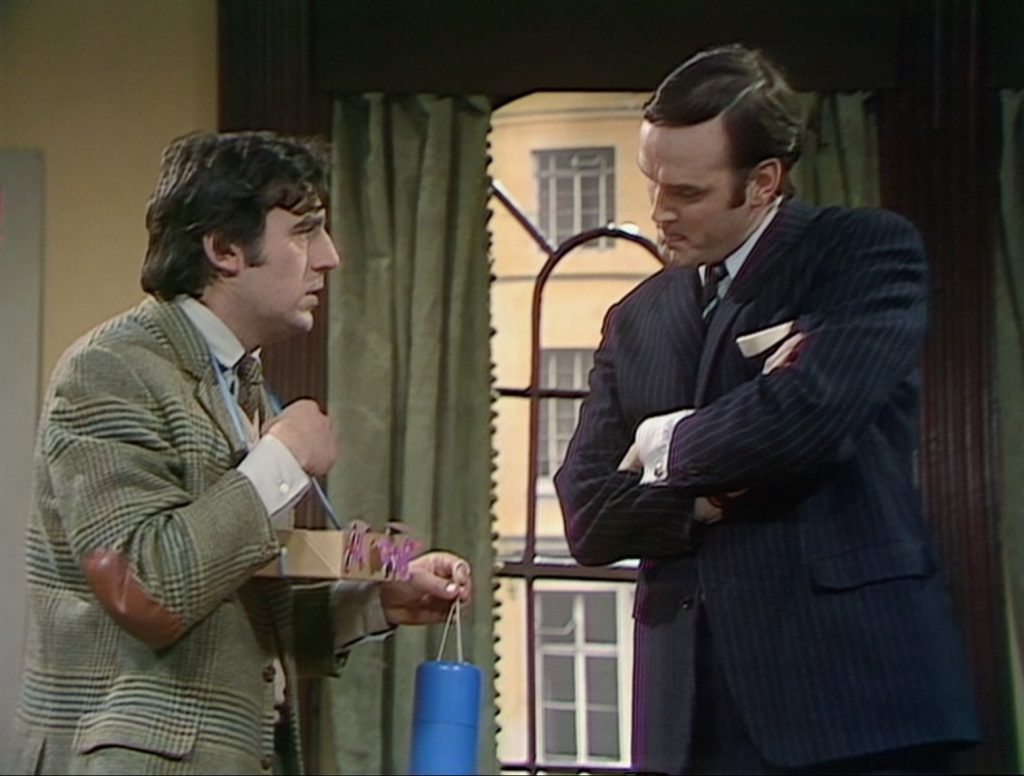
Series 3 is famously the period when John Cleese started to worry the troupe had started to repeat themselves, and there are whiffs of that belief in this fourth episode. “The Man Who Speaks in Anagrams” (Idle) is amusing but ultimately a variation on similar ideas about people with extreme dialogue quirks, the “Mary Recruitment Office” revived the idea of a random person accepting a job to be part of a BBC sketch, and “The Man Who Makes People Laugh Uncontrollably” evoked the troupe’s classic “Funniest Joke in the World”. The other skits aren’t entirely successful even if they’re less obviously indebted to previous ones. But I did laugh during the “Merchant Banker”, sketch where Cleese plays a bank employee who can’t fathom the concept of charity when someone (Jones) asks for a donation to help orphans, and Palin’s performance lights up the “Gestures to Indicate Pauses in a Televised Talk” sketch. However, the rest felt humdrum or silly in too much of an obvious way — like involving pantomime horses. Even Gilliam’s animation failed to stand out, and the one involving “Househunters” literally stalking ambulatory homes seemed weak. Even the recurring joke of words appearing in anagram form (including the end credits) felt indebted to that time “spam” was plastered everywhere.
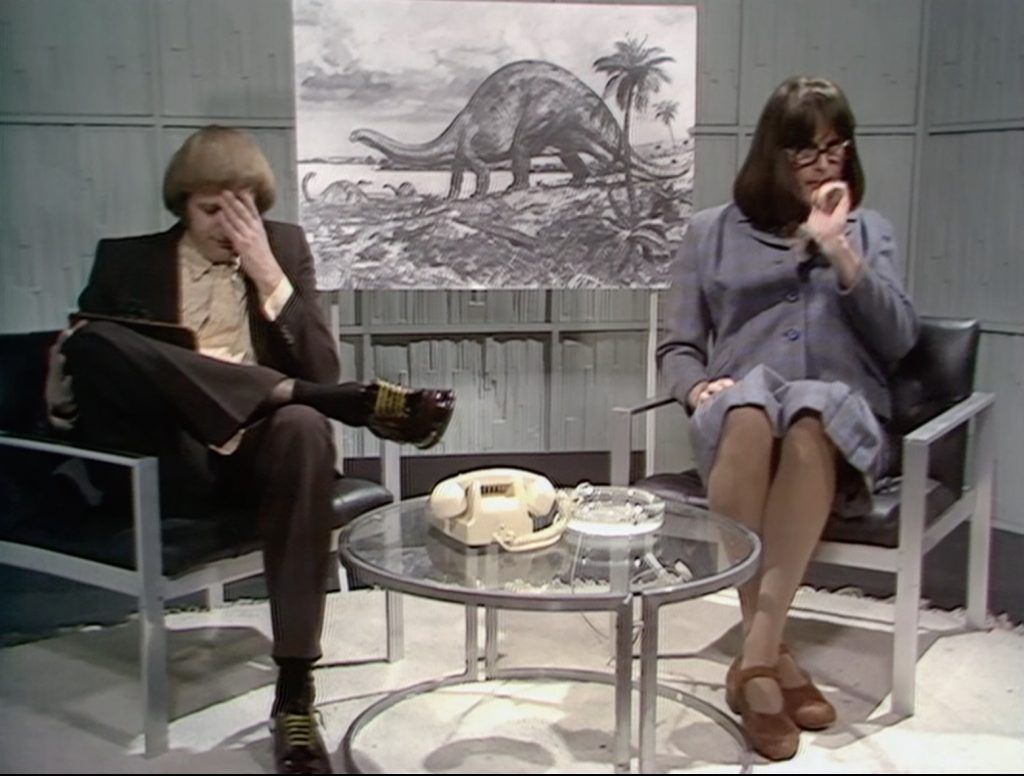
There aren’t many outright bad episodes of Flying Circus, but this gets close. The main problem is how most of the main sketches drag on too long or attempt to mine humour by outstaying their welcome. “Summarize Proust Competition” opens the half-hour on a weak note, in a sketch written by Palin and Jones that used the format of a Miss World competition for people to summarize the work of Marcel Proust, and it’s not especially funny and hasn’t aged well. A joke from “The Money Programme” where the show’s credits rolled too early is done again (earlier) before we’re onto a run of misfires: “Hairdressers Climb Up Mount Everest” (the title says it all) and “Fire Brigade” (where an oafish couple find they can’t get through to workshy firemen). Things perk up slightly with “Travel Agent”, despite how it’s yet another variation of a character with a bizarre verbal quirk (Idle’s customer pronounces the letter ‘c’ as ‘b’), before almost flatlining completely with “Ann Elk’s Theory on Brontosauruses” with the eponymous expert (Cleese in drag) is unable to expound on her theory when interviewed because of a nuisance cough and an inability to offer up the information quickly. As a whole, “The All-England Summarize Proust Competition” is mostly forgettable rubbish, sadly, although it does moderately improve in the second half due to some recurring jokes (the best being how a phone operator seemingly asks everyone their shoe size). Amazingly, Cleese revived Ann Elk for the 2014 farewell live shows — Monty Python Live (Mostly) — so maybe it works for some people.
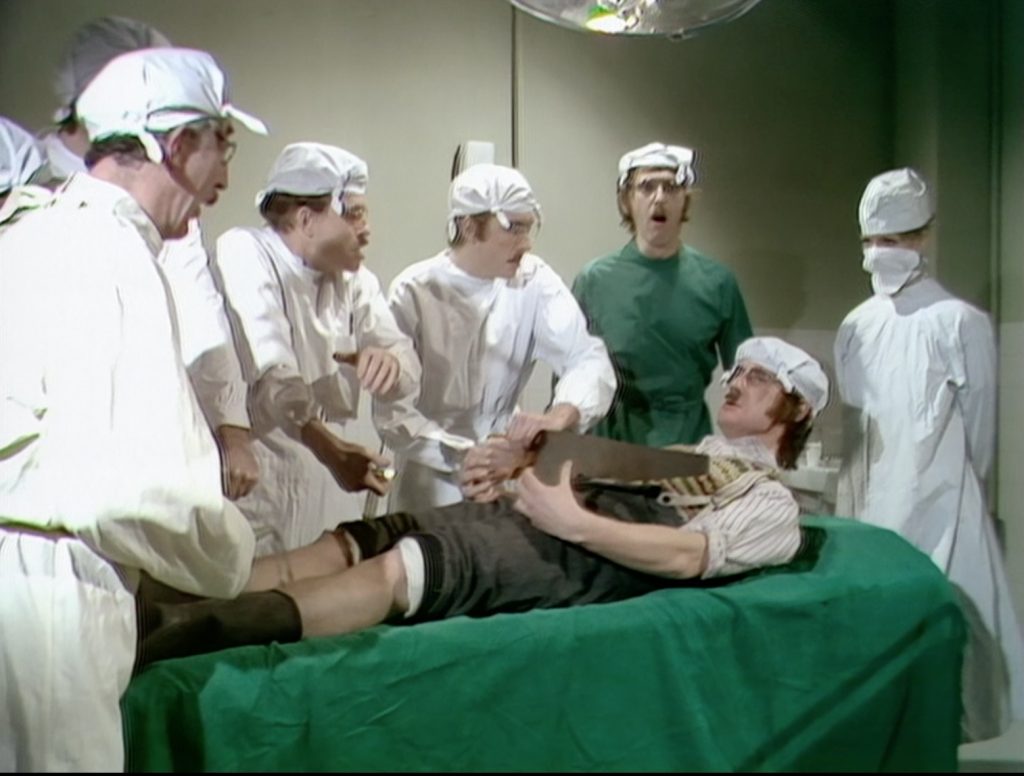
Another middling half-hour, really. It does have a memorable ‘Gumby’ sketch with Palin and Cleese, where “my brain hurts!” became a catchphrase, plus a sketch called “Expedition to Lake Pahoe” where Chapman plays a Naval officer trying to keep a controversy quiet (“… there is no cannibalism in the British Navy. Absolutely none. And when I say none, I mean there is a certain amount.”) Some early-1970s political incorrectness also bubbles to the surface in a “Molluscs Live TV Documentary” where Cleese’s host disparages homosexuality (in the animal kingdom), which it’s always awkward to see coming from a show one forgets didn’t escape some outdated opinions. The rest of the episode’s mediocre, not sparking to life in any memorable way.
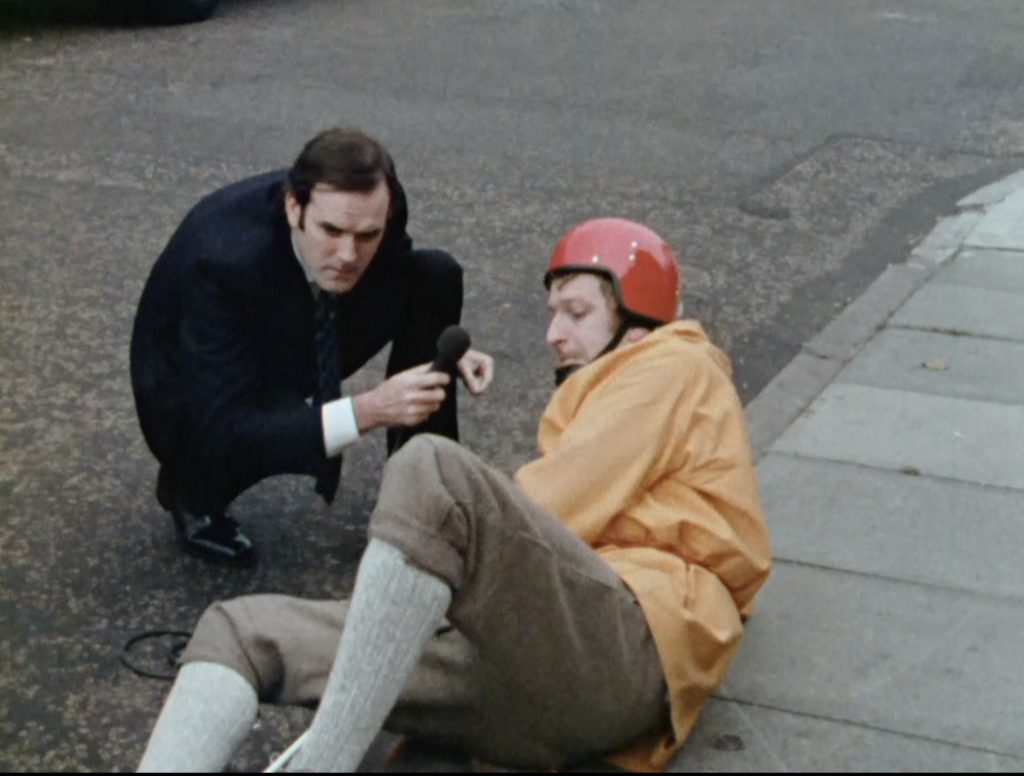
After a string of misfires, it was blessed relief to watch “Salad Days”, one of the best episodes of Flying Circus in ages. Things began shakily with more homophobic moments in “Biggles Dictates a Letter”, ironically with Chapman as Biggles, who was gay in real life, but things rapidly improved. The “Climbing the North Face of the Uxbridge Road” sketch was inspired lunacy with a team of mountaineers crawling up a road like they’re conquering Everest, then we had “Lifeboat” (with Jones’s housewife interrupted by folk from the RNLI, who think her house is a lifeboat) and “Old Lady Snoopers” with Cleese and Idle as women using high-tech gadgets to spy on neighbours. Both amusing, but then a true classic arrives with “Cheese Shop Sketch”, where Cleese (whose real surname is Cheese) plays a customer who can’t guess what variety of cheese Palin’s shopkeeper Mr Wensleydale sells from an exhaustive list. One of my absolute favourites. The episode even closes with a more graphic moment, hinting at the kind of adult violence the Python’s would lean into more with their movies, with the “Sam Peckinpah’s Salad Days” sketch — where a quaint English scene becomes a bloodbath with severed limbs and decapitations. There’s even room for some meta-comedy and format-breaking moments, with Jones dictating “The Show So Far” and making all the previous sketches sound ridiculously stupid, then another instance of the episode ending early and continuing past the credits with some on-screen apologies (for the “Salad Days” violence) and a “Seashore Interlude” where Cleese admits the running time was short this week and they’ve had to pad things out. It’s taken a while, but Series 3 finally an unequivocal good instalment that was more hit than miss.
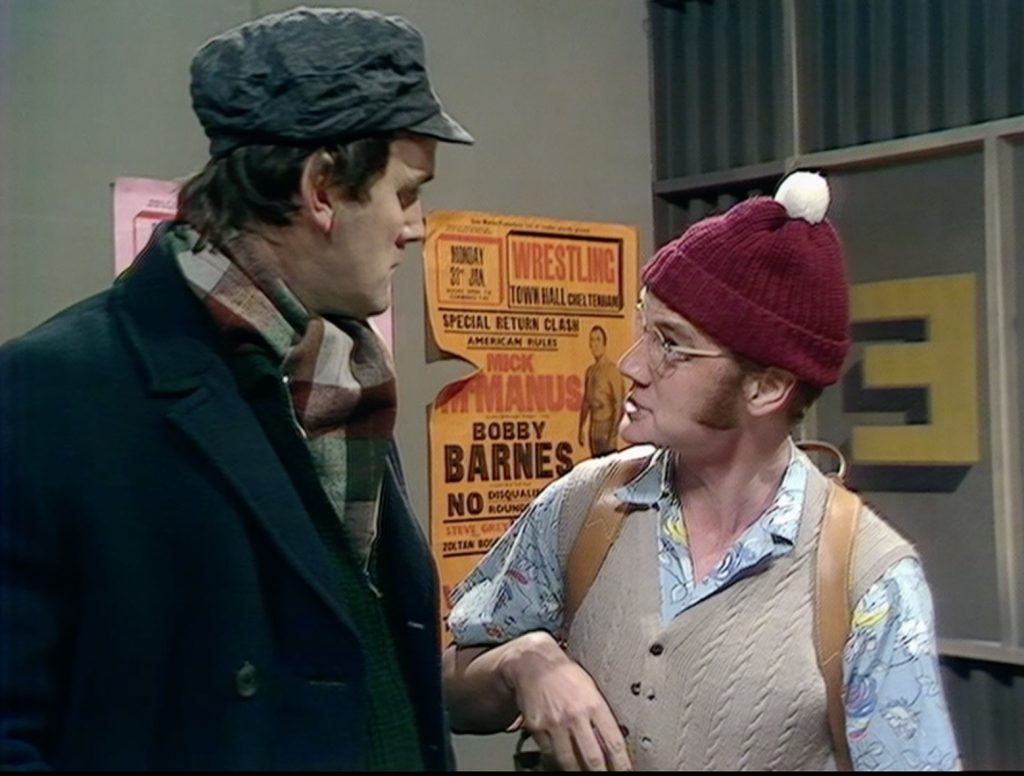
One thing to appreciate about episode 8 is how it tells a single story, focusing on Palin’s nerdy cyclist Mr Pither, who’s on a tour and keeps falling off his bicycle and generally getting on people’s nerves in his attempts to get back on the saddle and continue his holiday. It was mainly written by Palin and Jones (although Chapman and Cleese wrote the last third) and feels like something the Python’s would do after Flying Circus. It’s amusing to an extent, but there’s not really much here that’s powering the narrative along, so it’s easy to lose patience after the first 10-minutes. It sort of drifts in and out interest, depending on how each incident tickles you — or not. The sight of Chapman in yellowface as a bingo-obsessed Chinaman is another unfortunate reminder this classic series wasn’t progressive in terms of racial politics, but otherwise “The Cycling Tour” is innocuous enough. I liked how it did something different. It just doesn’t feel like Python to me, more like a nascent episode of Ripping Yarns.
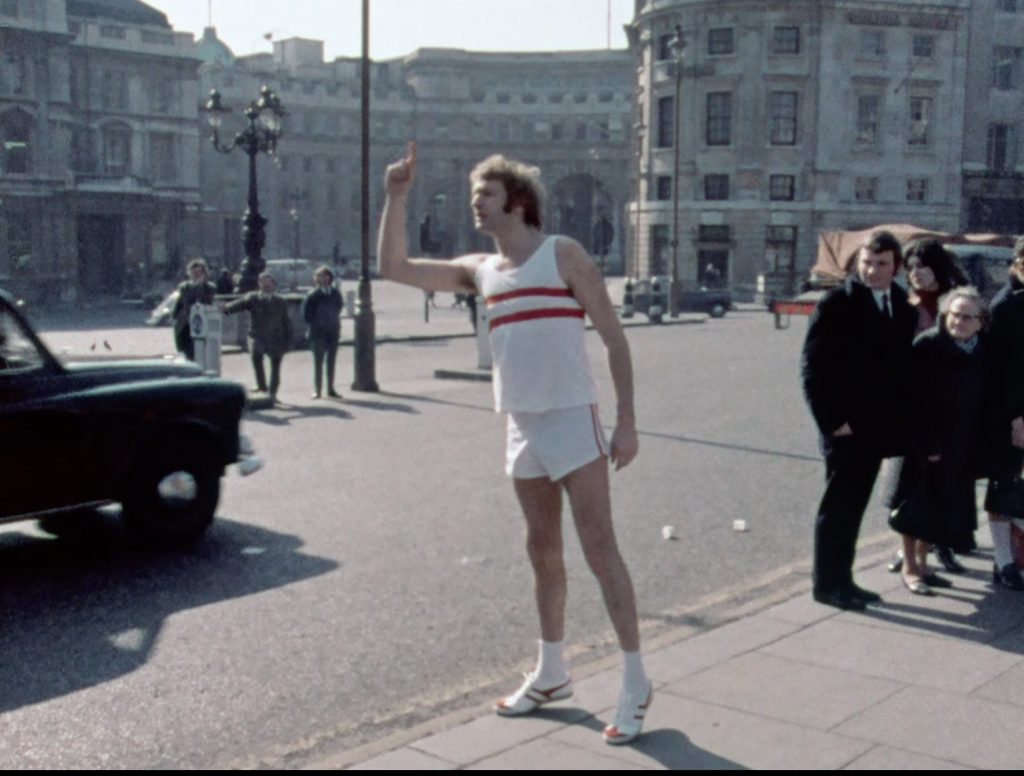
This episode feels like the Python’s got a second wind, as it’s jam-packed with sketches and most are of good quality. And even the mediocre ones are at least doing something creative, which is often the main attraction with a comedy sketch show this absurd. The “Bomb on a Plane” opening is amusing with a Scotsman called Mr Badger (Idle) trying to extort two pilots incompetently, only to recur throughout the episode asking to be paid off to not interrupt sketches for tiny fees. There’s frequently more meta-comedy and in-jokes with Python this series, too, with the opening “Nude Organist” and Cleese’s announcer seen preparing for their brief roles like important thespians, while Terry Gilliam is briefly seen animating himself before one of his cartoons. And we really have a slew of memorable ideas mixed throughout, from a “House Project Built by Characters from 19th-century English Literature” that leads into a “Flats Built by Hypnosis” idea, to an “Olympic Hide-and-Seek Final” that goes international and lasts years. I wish we’d got more of “The Cheap-Laughs” — two horrendous neighbours (Chapman, Jones) who ruin a couple’s evening by dropping their trousers, falling over, planting whoopie cushions, etc. A few of the sketches could perhaps have been better, like “Prices on the Planet Algon” (where the joke is that small items cost a fortune), and even “Mortuary Hour” gets by thanks to Palin expertly playing an old codger who can’t spit his words out. The episode, which is a little longer than usual, passes by so quickly that the misses barely have time to register. And there are plenty of callbacks to old material and sight gags, like the trusty 16-tonne weight dropping on people and the return of the armoured knight with a dead chicken.
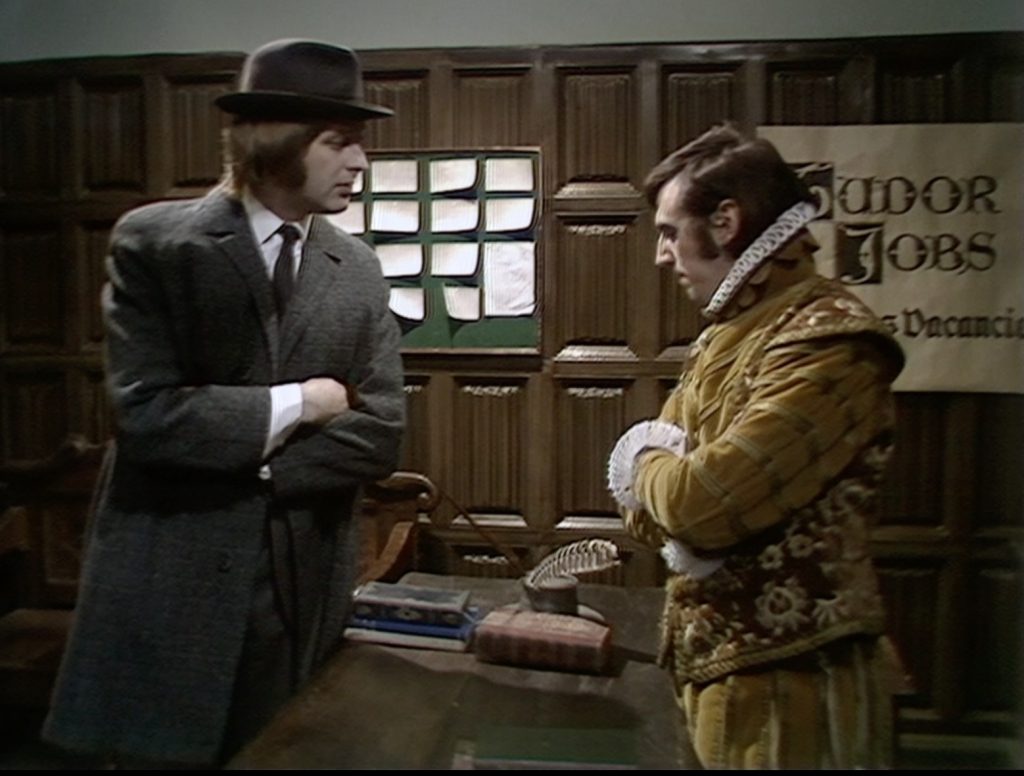
An interesting episode, as it takes half the runtime for the opening credits to roll and the loose theme is of censorship and pornography. The “Tudor Jobs Agency” sketch segues into a “Pornographic Bookshop” skit, which in turn transitions into “Elizabethan Pornography Smugglers” where Palin’s customer in period dress tries in vain to convince people he’s an undercover cop looking to close down their premises, only to find himself transported back to Elizabethan times and keen to pretend he’s contemporary. It seems like we might be in for another long narrative, but the second half of the episode is more traditional — bolstered by “Is There? Life After Death” with Cleese tackling life’s big mystery with three dead interviewees, and “The Man Who Says Things in the Wrong Order” (which could’ve been better, but is still an amusing tweak on the Python tradition of characters with verbal quirks). What’s most interesting about “E. Henry Thripshaw’s Disease” is what we don’t see, as the BBC censored this instalment quite extensively — so the sketches “Big Nosed Sculptor”, “Revolting Cocktails”, “Half a Bee”, and “Wee-Wee Wine Cellar” went unaired, together with some of Gilliam’s animations.
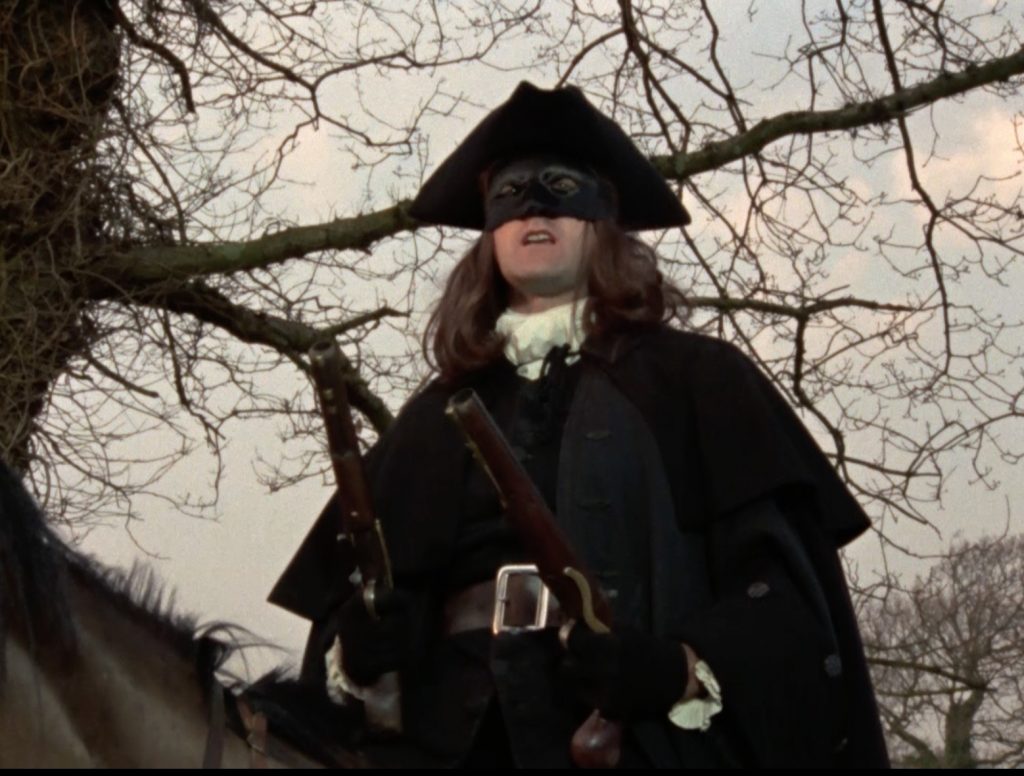
Opening with an amusing “Boxing Tonight” sketch, where boxer Jack Bodell defeats art historian Sir Kenneth Clark (played by Chapman), there isn’t much to recommend about “Dennis Moore” beyond the recurring sketch that gives the episode its title. Here, John Cleese plays a stereotypical 18th-century highwayman (well, when not riding a horse in the outdoor sequences), obsessed with stealing lupins from the rich and giving them to the poor. He even has his own Robin Hood-style theme tune. It’s a simple but delightfully absurd idea, with a funny punchline when it becomes clear the peasants he gives his swag to are desperate for food and medicine and hate their would-be saviour’s constant deliveries of useless lupins. Sadly, the sketch keeps recurring to no real improvement or point, with only minor diversions, and the half-hour’s somewhat tainted by a distasteful later sketch called “Prejudice” where Michael Palin plays a smarmy host of a game show focused on calling people from minority groups derogatory names. Considering Python’s own unfortunate dalliances with blackface/yellowface and light homophobia, it’s a complicated viewing experience. There’s also some deep meta-comedy with “What the Stars Foretell”, which was written by Palin and Jones as a parody of the kind of sketch Cleese and Chapman would come up with.
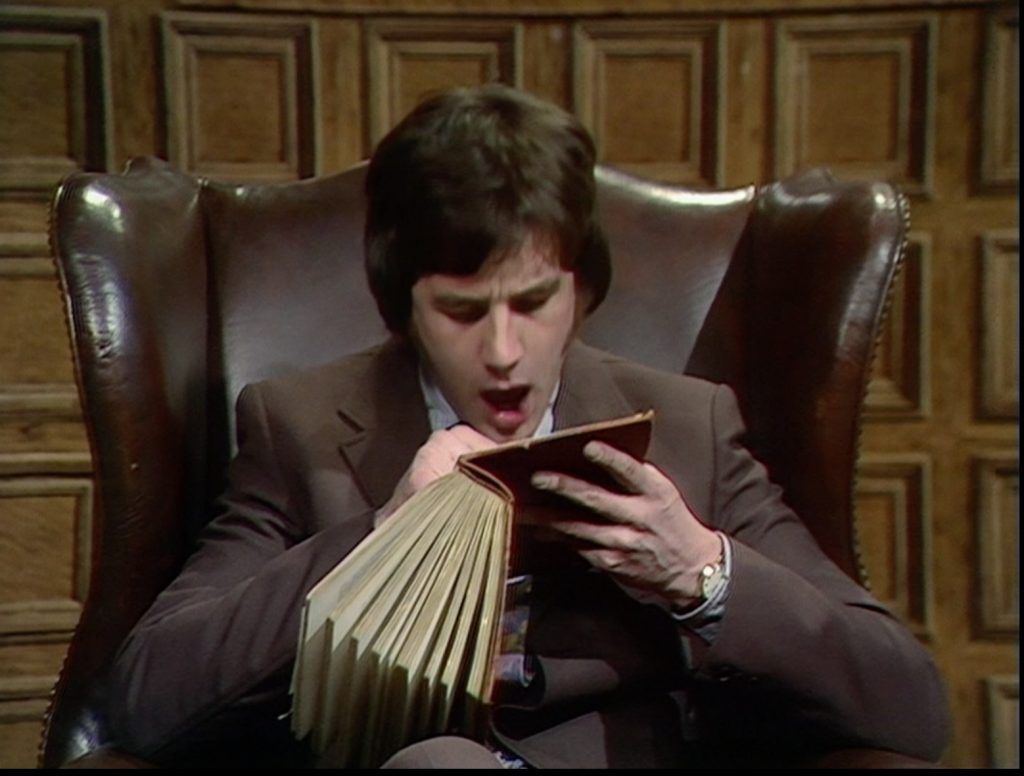
The penultimate episode of Series 3’s a bit mediocre, although I giggled over “A Book at Betime” because of Palin’s performance as someone who couldn’t read Redgauntlet, plus the idea of “Kamikaze Scotsmen” requiring a dedicated bomb squad to defuse them in “Unexploded Scotsmen”, and the nonsense of enlarging penguins so their brains are a comparable size to humans in “Frontiers of Medicine” with Chapman presenting his theory. “Spot the Looney” was also amusing with Idle on cheesy game show hosting duties. Other ideas seemed a little forced, however, like Idle trying to tutor someone on how to use the phrase “no time to lose”. Interestingly, this remastered box-set from Network doesn’t include the “Dad’s Doctors, Dad’s Pooves, and Other Interesting Stories” sketch that runs post-credits, which is otherwise available on iTunes and Netflix. But it does include the “Party Political Broadcast (Choreographed)” sketch with Cleese and Idle, which is also often cut from this episode.

Series 3’s finale tickled me throughout, from Eric Idle in old-age makeup (surprisingly accurate to how he looks now) as the procrastinating host of a showbiz awards show, to a sketch where Oscar Wilde’s (Chapman) witticisms are turned against him during a posh party. There are some delightful moments of absurdity throughout, like David Niven’s fridge accepting an award on his behalf, a dummy salesman arriving in the “New Brain from Currys” sketch, a nightmarish sequence in “Pasolini’s Film ‘The Third Test Match’”, and Idle’s character in “Blood Donor” who wants to give urine to Cleese’s doctor instead. There’s some an equal number of moments that don’t work so well, like the “Charwoman” superhero animation with a big-bosomed naked woman, or the “International Wife-Swopping” joke—but, for the most part, the series ends with enough laughs. And this also marks the last appearance of John Cleese for Python on TV, in a sketch where he’s seen in bed with Palin.

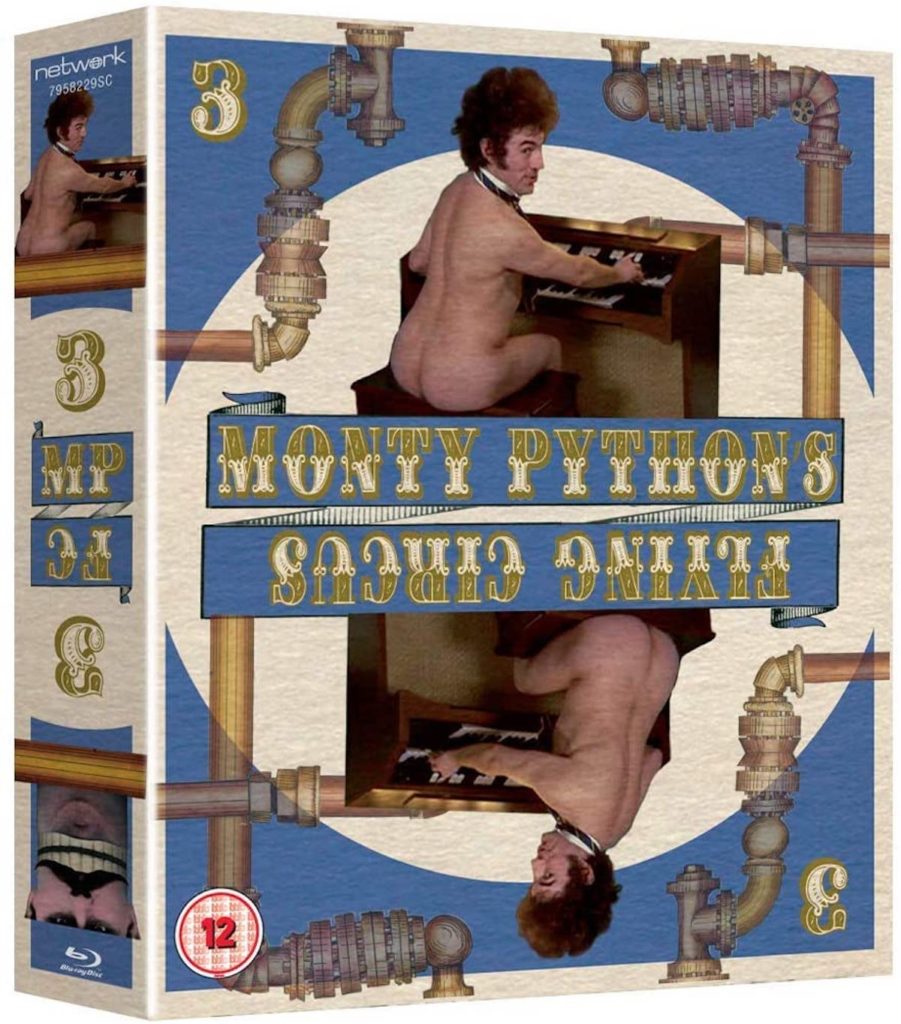
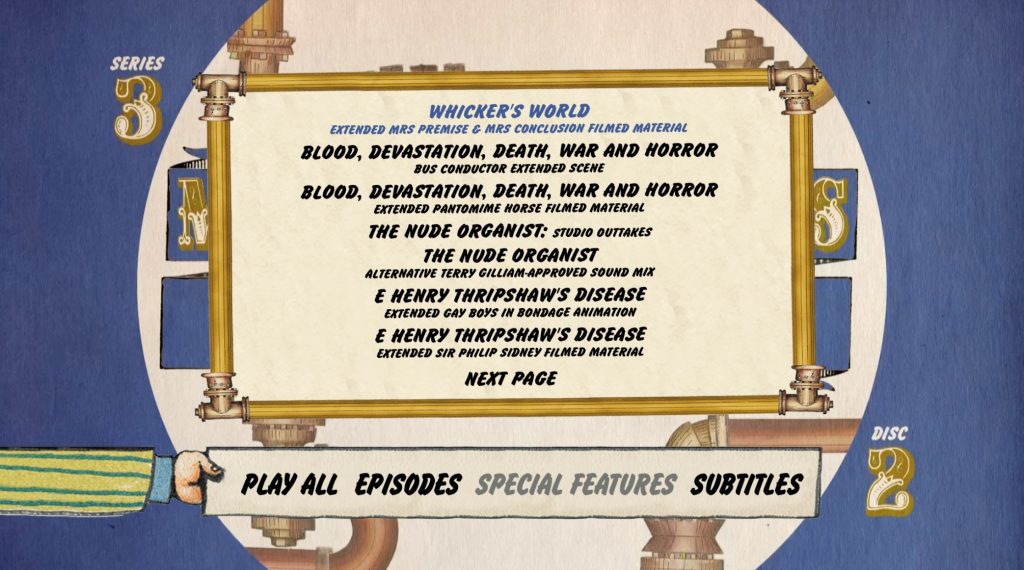
As already discussed in greater detail for my Series 1 review, this batch of episodes continues the sterling work in upgrading the picture and sound so it’s more palatable to modern audiences. It’s not a revelation until you compare it to how muddy and noisy the show looks on DVD, or streaming on Netflix, but the brighter colours and sharper images (especially in the external scenes shot on 16mm film) make Network’s box-sets the gold standard right now.
The extra features below are more of the same, with some reinstated footage and B-roll from studio filming. Some moments are interesting for capturing the mood on-set and delivering a feel for how early-1970s BBC TV shows were put together, while others are relatively brief extras for completists only.
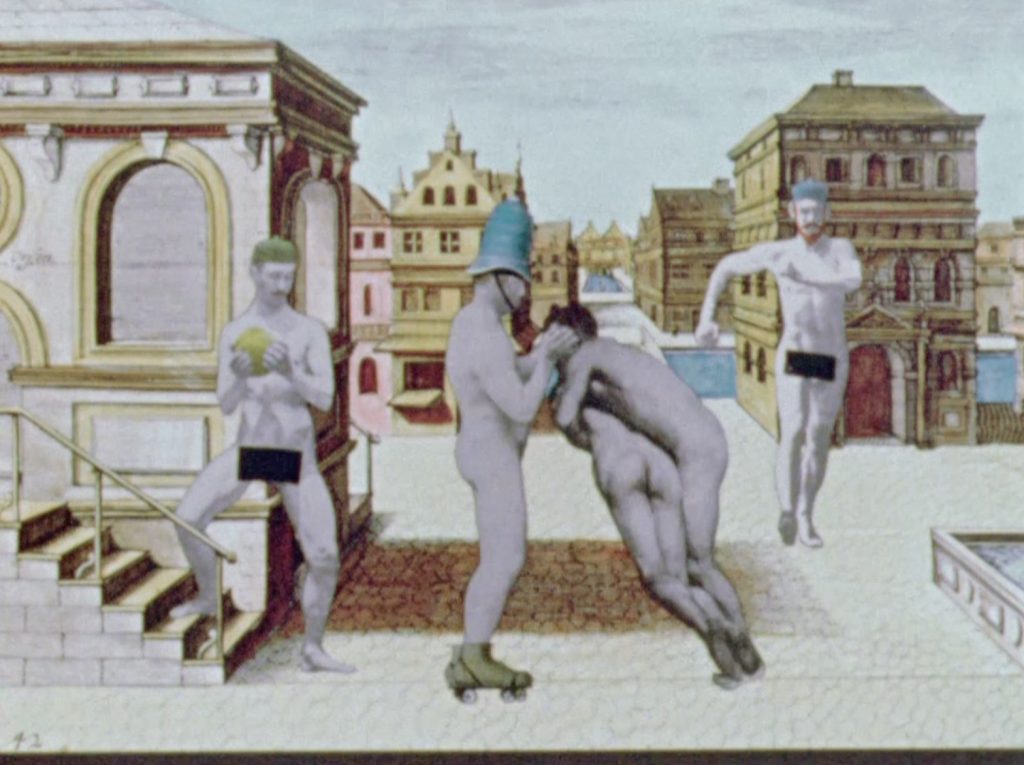
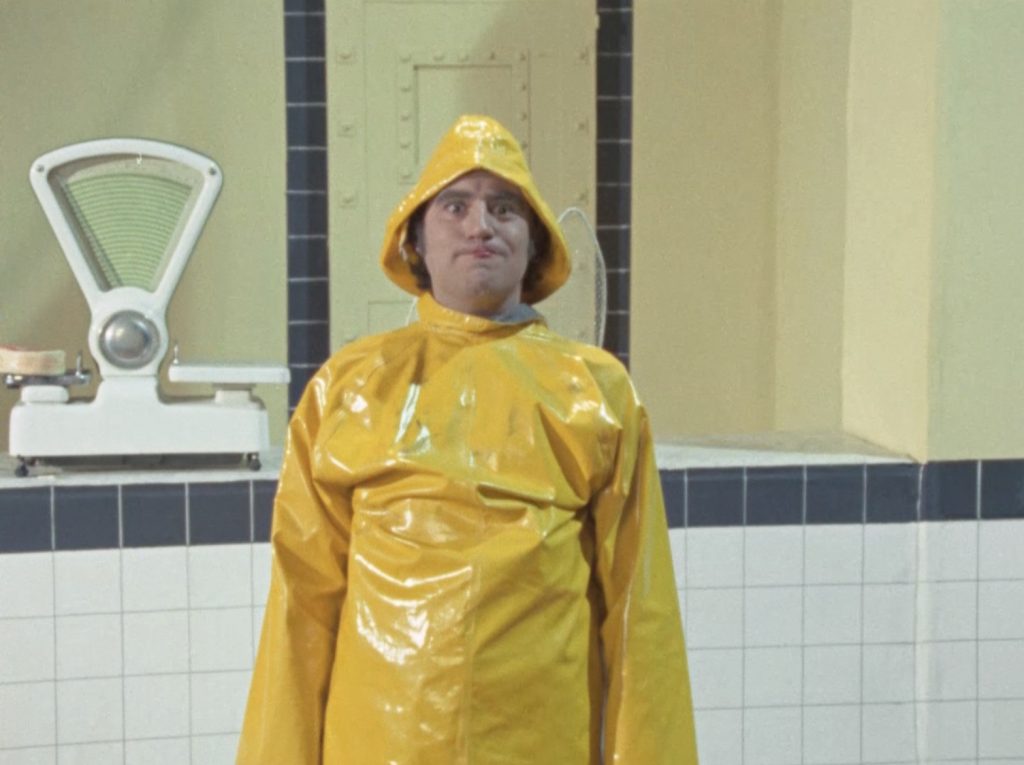
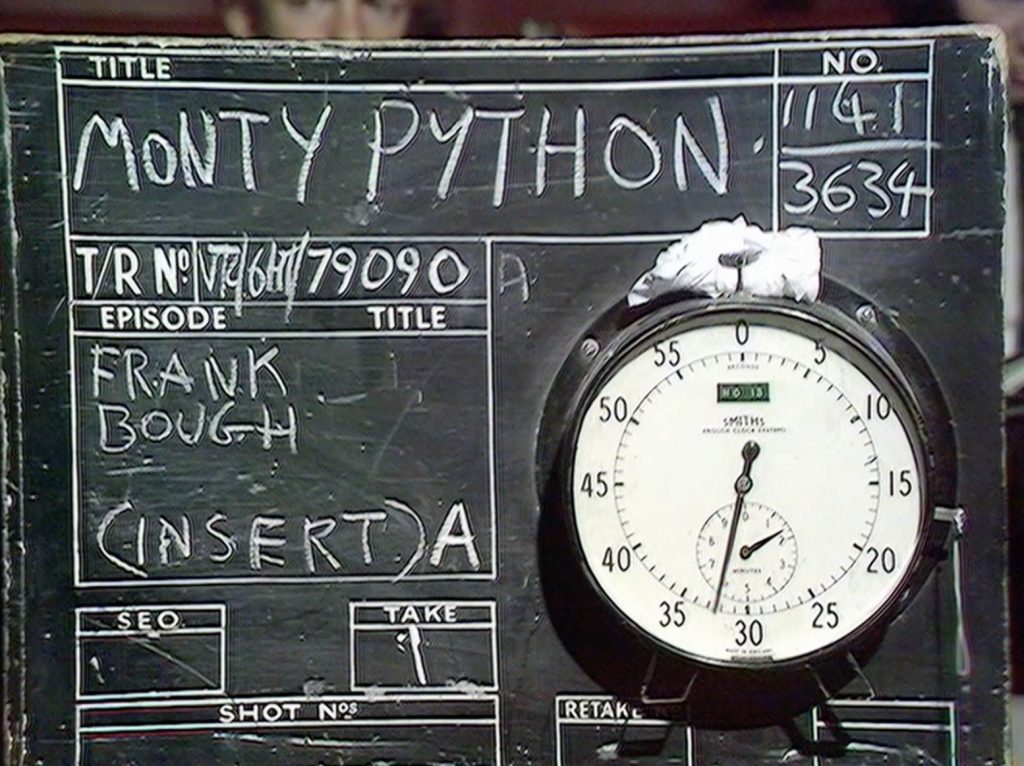
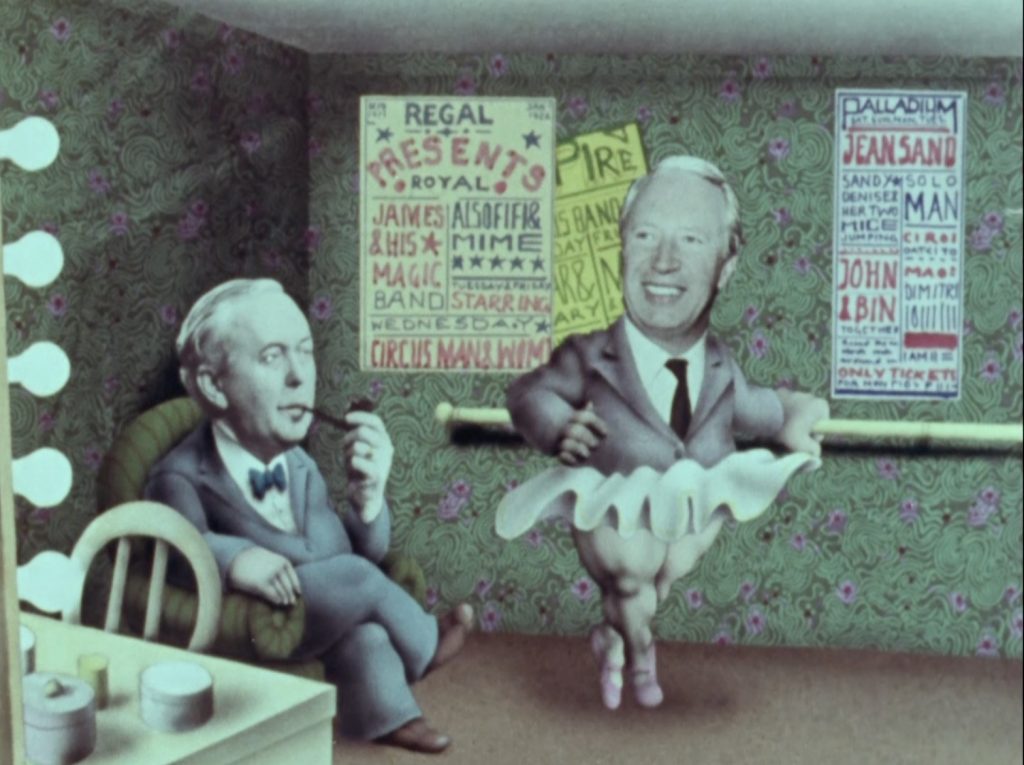

writers: John Cleese, Michael Palin, Terry Jones, Graham Chapman, Eric Idle & Terry Gilliam.
director: Ian MacNaughton.
starring: John Cleese, Michael Palin, Terry Jones, Graham Chapman, Eric Idle, Terry Gilliam & Carol Cleveland.
To celebrate this home video release, Frame Rated is giving away 1x Blu-ray of MONTY PYTHON’S FLYING CIRCUS: Series 3.
To be in with a chance of winning a copy, simply answer this question:
a) An albatross.
b) A budgerigar.
c) A parrot.
If you know the answer:
